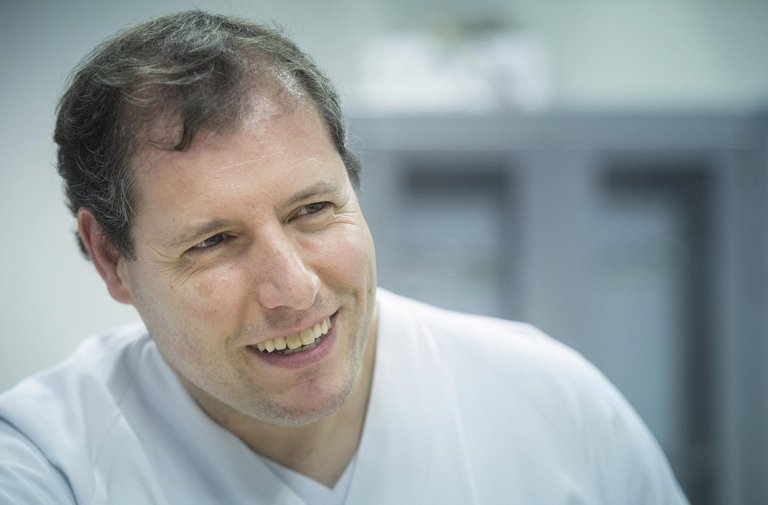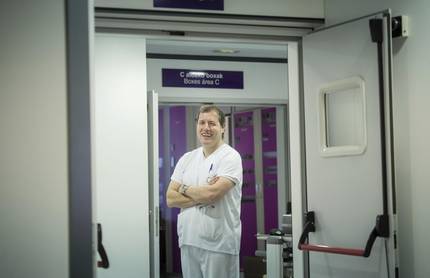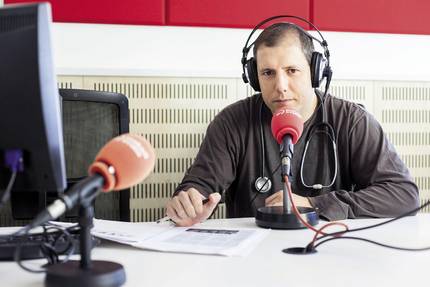“Doctors have as their mission to help with death and fleeing it is to be a professional evil”

I think it is very important because we also need a general culture and I believe that one of the great mistakes that we have made doctors have not been able to explain in an understandable way because we have used very technical words. Now it seems that body and disease are a great mystery. This lack of information causes us to take care of health at the time of illness and not prevention.
And then, when a patient comes to us, the important thing is to trust him. If we don't get the trust, we have it lost! And in order to achieve trust we must inform ourselves comprehensively.
We have seen that influence, both for good and evil. That is, when we give a diagnosis to a person, I know that by the next morning he has read it. With that we count. However, the question is where you have consulted that information and whether it is reliable or not. Having so much information also requires filtering the information: it is sometimes adequate and sometimes not. I could have pneumonia and some will say what antibiotics are needed to treat, and others would say that it is cured with pasmobelar pneumonia.
Society has changed. Before we said that the doctors were very paternalistic: we decided and the patient did what we said. Today this has changed: information has grown, we have more capacity and tendency to make more and more decisions in our daily lives. And why not in medicine?
However, we still have work to do. Autonomy is informing, proposing alternatives and ownership of people. And that, on the one hand, is another way of working, it asks you to provide more information, but on the other hand, society itself has to recognize it. It's not that easy. On the one hand, it requires greater knowledge, but a global knowledge regarding life. Many times a person comes to us and we say to the family: “The situation is serious. Let’s tell the patient.” And the family tells you: “But how do we tell you that?” And why not?
In addition, it is always said that doctors have decided that we have been a factual power. I'm not going to say anything, but for others it has also been very comfortable. This change demands a habit of making decisions, also with our life and health. Assumption responsible for health. Health is ours and we have to decide. And, somehow, that those around them break those barriers of silence, which often have a paternalistic attitude. If a patient recognizes a serious illness and decides not to treat it, will the others accept it?
On the other hand, the relationship between doctors and patients has been modified by new technologies, with the risk of a computer barrier. If they put me in front of the computer, with all the information, and instead of talking to the sick man looks at the computer, I am creating a barrier without wanting. That is very sad for the patient.

There we should find the cause of death: when death is very fast, there is hardly any process. But the most common causes of death today are three: cardiovascular brain diseases (dementias), heart attacks, and cancer. Therefore, most are progressive and there, somehow, we need real information. That is, we have another mistake. “Do everything for me or, more than for me, for my family.”
But what is “doing your best”? If I know that a disease has a life expectancy of 3 months, is it possible to give chemotherapy to that person? For me that is not correct. For this person it can be much more real to say: “Look, you have an incurable disease, we don’t know why, but you’re in the short run. If you have any illusion in life, do it. Let yourself be carried away by the environment.”
And there are traumatic and not traumatic processes, because death is a taboo that we have removed from our society. We have moved him from house to hospital, or to nursing homes, and we do not see or recognize death as a natural process. But, however, I would say, from my experience, that if there is something nice in the world, that is to see a person die quietly. “I have fulfilled my world time, I have done what touched me, I am at peace with all those around me, I have said goodbye and I leave.” And in the time when it comes to us, it is very beautiful.
But on other occasions, those around him do not let him die calmly and somehow we make some fences of silence, that is to say nothing to patients. The sick person is not foolish, he knows that he has, that he is not well. We don't let him die and say goodbye.
We must let the patient communicate, lose that fear. We can’t keep the medicine kit until the last day and suddenly say “it’s dead.” This also has serious consequences on the environment: traumatic death is not only sudden, but denial.
We must tell the patient the truth he can accept. I believe that these news cannot be given at once. You cannot say: “You have an incurable disease and you will also die in 6 months.” But you can say: “You have a serious illness. We will try this treatment, but know that some go well and others don’t.”
And how to help? As far as possible, be with him, next to him, ask if he has any illusion to fulfill his life… and talk about how he wants death. “I, when I get to that point, so and so I want” and somehow break that code of silence.
I remember a close person telling me: “I’m almost 80 years old, I have cancer and I know it won’t heal. Please do not give me chemotherapy. But my illusion is to go to the communion of my grandson.” He went to the communion of his grandson and then said: “Please don’t take me to the hospital, keep it at home.” And this is why the healthcare system is being adapted. Structures are also being created for these last-minute palliative care: there are home hospitalisation services. Somehow, we have to return the sick to their environment. Here are some verses: “I would like to die in the bed I was born in.” I don't know if that is possible, but at least in a natural environment yes. What does not make sense today is death from suffering: death with pain or stomach.
If death is sudden the help of these chemicals is necessary. In an accident, the patient who has suffered a blow to the head, I must be anesthetized with a mechanical respirator, etc. I have to try my best to heal. There you have to introduce anesthesia and everything, and the consciousness is completely broken.

In other situations, when death is foreseen and you know what is coming, we take medicine and other things, and live in a much more natural way. The existence or not of these experiences of the last moment — tunnels of death, etc. — has been narrated by one or another patient, but few.
But for me there is one thing, in the first place, that death by suffering is not admissible. For no one. Doctors say we have healed, sometimes we heal, but we always have to help. At the moment when we can not cure, be next door, relieve symptoms, help the maximum…
Evidently, these families have much less trauma, since they live more calmly death. It is scientifically recorded.
Above all, I would not leave death for the last moment, not even without disease. I can die today, or tomorrow, and it is important to predict, see, say normally everything you want. And then, at the last moment, start the process before, the time to fire: “Who do you want to be with? Who to talk to? What rite do you want to do? Religious or not, I don't care. What do you want to do?” All this contributes in some way.
Sometimes yes. Many times, knowing what the sick person has, the locals say “no, I don’t want to have him at home. Take him to the hospital.” And they take him to the hospital. What's more, sometimes they get a sedative, but somehow, instead of benefiting patients, we're dealing with that stress or the current disability of this family. And so we see.
It's hard, it's always a burden. But it's also pretty. Helping you in an important moment of the person and his family makes you live very beautiful experiences. Hard, but I always argue that when a patient comes seriously, it is first a technical problem and then, when you know the environment, it becomes a humanized problem. I think it's a function of doctors and that running away from it is being a bad professional and being a coward as a person.
Many times, as a consequence of not facing all this, the doctor knows that the patient will die, but instead of saying it, it continues and continues to be treated. That is also a bad medical practice.
Buletina
Bidali zure helbide elektronikoa eta jaso asteroko buletina zure sarrera-ontzian











